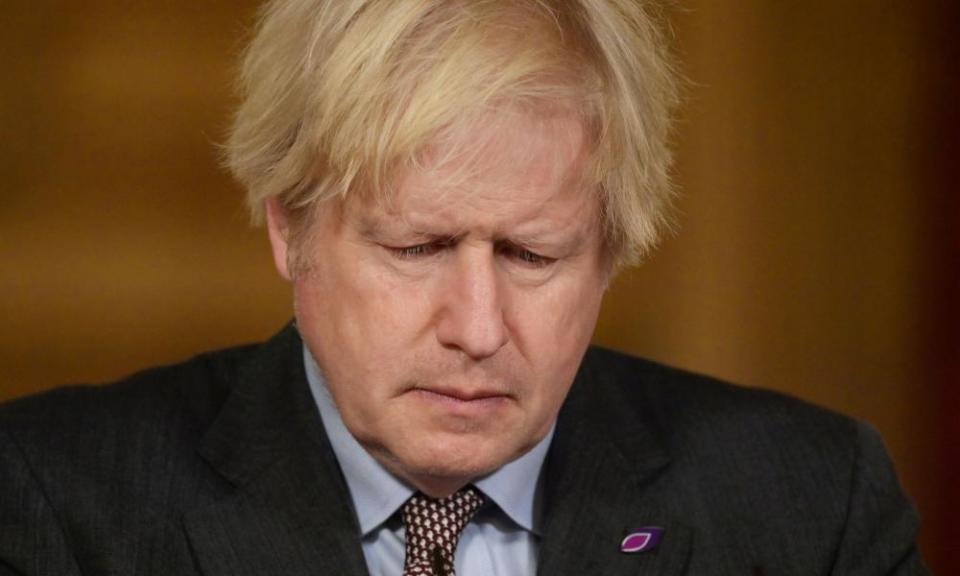Key questions PM must answer on his handling of Covid crisis

Boris Johnson has said “we truly did everything we could” to minimise loss of life from coronavirus, and insisted he takes “full responsibility” for the government’s handling of the pandemic. But when an inquiry is eventually carried out into the past 12 torrid months, the prime minister will have to face a series of difficult questions about key decisions he made.
Failure to grasp the gravity of the emerging crisis
As news first began to trickle out of China, triggering the government’s pandemic planning, the prime minister left the health secretary, Matt Hancock, to chair the first five meetings of the emergency Cobra committee about the virus.
After carrying out a fraught reshuffle of his cabinet, Johnson decamped to the taxpayer-owned mansion of Chevening, and did not chair his first Covid Cobra meeting until 2 March, just before the first confirmed UK death from the virus.
Comforted by advisers who compared the challenge to tackling seasonal flu, he tended to play down the seriousness of the pandemic in its early days, insisting it was “business as usual”. Most memorably, he told a Downing Street briefing that he “shook hands with everybody” during a hospital visit in early March.
Keeping Britain’s borders open
With the support of scientific advisers, Johnson took the decision to lift border restrictions on 13 March last year after evidence emerged that the virus was already circulating in the UK, despite a strict quarantine regime for arrivals from Wuhan, in China.
At the time, the harsher approach adopted early on by countries such as Singapore and New Zealand, involving flight bans and quarantine, were regarded as extreme by ministers. But many analysts now believe closing the borders was an important precaution that helped these countries and others fare much better.
Delaying lockdown last March
Johnson announced a full-blown lockdown on 23 March last year, with little idea at the time that it would remain in place until July, with many children kept out of the classroom until September.
He had edged towards the shutdown via a series of intermediate steps, including banning mass public events and exhorting the public to avoid unnecessary social interaction and to work from home where possible.
Only when modelling carried out by Prof Neil Ferguson at Imperial College London suggested there could be up to 500,000 deaths if the virus was not brought under control, and amid growing signs that the public were taking matters into their own hands, did Johnson order the public to stay at home. Some public health experts now believe an earlier shutdown could have saved many thousands of lives.
Not sacking Dominic Cummings after his Barnard Castle jaunt
When it emerged that his top adviser had flouted lockdown rules by driving 300-plus miles to Durham, with a day trip to a local town thrown in, Johnson stuck by him resolutely. He told the public at a Downing Street press conference that his aide had acted “responsibly and legally”, in crisscrossing the country, ostensibly to seek childcare for his young son, and then to test his eyesight, at a time when the public were being urged to stay at home.
His decision sparked an avalanche of angry emails to MPs and risked undermining public confidence in lockdown rules at a critical time.
Outsourcing test and trace
The former TalkTalk executive Dido Harding was brought in by Johnson and Matt Hancock to run the hugely costly test-and-trace system, which has relied heavily on private sector outsourcing and has not worked as effectively as hoped.
Councils carrying out their own local contact-tracing operations have generally obtained better results than the call centres run by Serco and other providers, while management consultants have in some cases been paid £7,000 a day for their expertise in setting it up.
Johnson and his chancellor, Rishi Sunak, have declined to fix holes in the social safety net – including the paucity of statutory sick pay – that have created a strong financial disincentive for many people to self-isolate.
Rejecting calls from Sage for a ‘circuit-breaker’ lockdown in September
Chris Whitty and Patrick Vallance gave the prime minister a briefing on 16 September setting out the dire risks of allowing the virus to run unchecked as cases increased into the autumn. Their colleagues on the Sage committee suggested a short “circuit-breaker” lockdown, perhaps over the October half-term.
But Downing Street aides made clear at the time that Johnson considered it to be his role to weigh up scientific advice with other considerations, including the economic and social costs of a fresh lockdown.
He therefore opted for a middle course, between the scientists’ proposal and the demands of many in his party to resist fresh restrictions: a beefed-up system of “tiers”, with tougher rules for the hardest-hit areas.
In the event, as Whitty predicted when they were introduced, even the strictest, tier 3 rules did not do enough to restrain the virus, and a month-long lockdown was announced on 31 October.
Resisting ‘cancelling Christmas’
A month before Christmas, the government agreed a plan with the Scottish, Welsh and Northern Ireland administrations that would allow up to three households to mix for a fixed five days over the festive period.
Johnson then stuck resolutely by the plan, even as cases surged in London and Kent. Matt Hancock alerted the House of Commons to concerns about a new variant of the virus on 14 December, “which may be associated with the faster spread in the south-east of England”.
When Keir Starmer called for tougher restrictions two days later, the prime minister accused him of wanting to “cancel Christmas”. It was another three days, after being warned of the increased transmissibility of the variant, before Johnson announced a travel ban and halted Christmas mixing across London and much of the south of England: but families in many parts of England were still able to meet and mingle for a day.

 Yahoo Finance
Yahoo Finance 